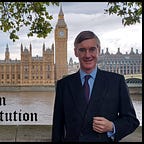Nigel Farage's letter to the Prime Minister, Sir Keir Starmer, asking for the right to appoint peers on behalf of Reform is perfectly timed for the constitutional essay I was about to write. It could also be his most astute move yet.
In terms of the immediate issue, Reform obviously deserves some peers. It would be in accordance with what has been done before, and is why the House of Lords has managed to continue even without any particularly logical basis for its composition. It has tended to represent all shades of opinion, and prime ministers have historically been generous to minority parties.
This may well have been more to do with political convenience than high-minded constitutional strategy, but the Ulster parties, the Greens, and most egregiously the Lib Dems, are all represented in the upper house by virtue of prime ministerial awards that have been filled by the respective party leaders. Even Plaid Cymru has received such patronage, but Reform has not. It is about time it did, because in terms of votes, at the last election it was ahead of the Lib Dems and the Greens, while it has more MPs than the Greens as well.
Although opinion polls rise and fall, the fact that Reform is now currently ahead of all parties in the polls is a further justification for some appointments to be made. This is especially true as it is not impossible that Reform could win the next election, and it would then need some expertise in the upper house if it were to do so. This applies if it became the largest opposition party, which is also possible.
Nonetheless, even if Starmer were to do the right thing and allow Nigel to make some appointments, he could not be expected to offer more than a handful, perhaps half a dozen, over the course of the Parliament. It would not conceivably be enough to solve a problem that last existed in 1924, and which may reoccur in 2028-29. A new party with a majority in the Commons, but with almost no representation in the Lords.
The 1924 precedent is the most obvious one, where Ramsay MacDonald became Prime Minister with the support of the Liberals, but Labour was virtually unrepresented in the then entirely hereditary House of Lords. MacDonald appointed only three new peers, partly because socialists were reluctant to accept the implications of becoming hereditary peers, but also because of a different feel for the Constitution.













